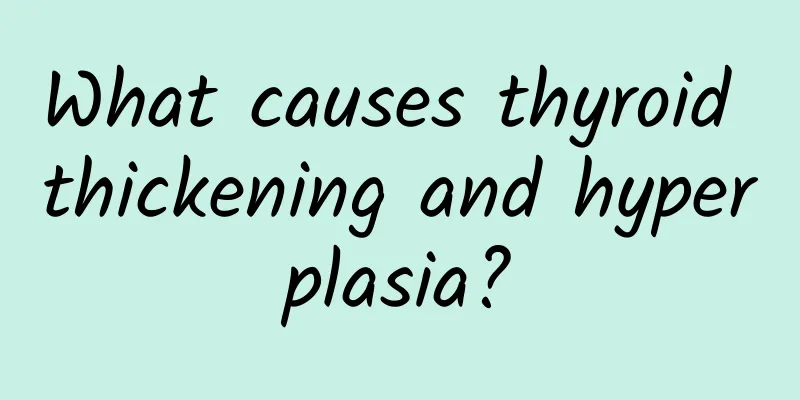What causes thyroid thickening and hyperplasia?

|
We all know that the thyroid gland is the largest endocrine gland in the human body. So what is thyroid hyperplasia? How to treat it? What should we pay attention to in terms of diet? Pathological nature Thyroid hyperplasia is actually non-toxic thyroid hyperplasia, also known as simple thyroid hyperplasia, which is caused by insufficient secretion of thyroid hormone, which leads to increased secretion of TSH and causes thyroid enlargement. According to geographical distribution, it can be divided into two types: endemic and sporadic. Endemic thyroid hyperplasia is more common in inland mountainous and semi-mountainous areas far from the coast. About 10% of the population suffers from the disease, which is more than 10 times the number of people with sporadic thyroid hyperplasia. [1] Pathogenesis The main cause of endemic goiter is iodine deficiency. Due to iodine deficiency in drinking water and soil, the body's iodine intake is insufficient, resulting in reduced thyroid hormone synthesis and mild hypothyroidism. Through the feedback mechanism, the pituitary TSH secretion increases, causing the thyroid follicle epithelial cells to proliferate and hypertrophy, resulting in thyroid enlargement. At the same time, the iodine absorption function is enhanced, which improves the thyroid gland's ability to synthesize and secrete thyroid hormone, allowing thyroid hormone in the blood to return to normal levels. At this time, the proliferating epithelium gradually returns to normal. If iodine deficiency persists for a long time, on the one hand, the follicular epithelium continues to proliferate, and on the other hand, the synthesized thyroid globulin cannot be fully iodinated and cannot be absorbed and utilized by epithelial cells, so it accumulates in the follicles, causing the follicle cavity to expand significantly, which causes the thyroid gland to swell further. Large. The body's increased demand for iodine or thyroid hormone (for example, during puberty, pregnancy, and lactation) causes a relative lack of thyroid hormone in the body, which can also lead to thyroid enlargement. In addition, some substances can cause a certain link in the thyroid hormone synthesis process to be impaired, which is also an additional factor causing thyroid enlargement. For example, long-term intake of large amounts of calcium not only affects the absorption of iodine in the intestine, but also increases the calcium ions in the cell membrane of the filtration epithelium, inhibiting the secretion of thyroid hormone. Fluorine, boron, and silicon also have similar effects. Certain foods such as cabbage, kale, and celery contain thiocyanate or organic chlorates, which can hinder the accumulation of iodine in the thyroid gland. Thiourea can affect the conversion of monoiodotyrosine to diiodotyrosine. Sulfonamides can hinder the condensation of tyrosine, etc. Treatment options 1. For physiological goiter, it is advisable to eat more iodine-rich foods such as kelp, seaweed, etc. 2. Patients under 20 years old with diffuse simple goiter can be given a small amount of thyroxine (TSH) to relieve thyroid hyperplasia and swelling. The commonly used dose is 30-60 mg, one course per day. 3. Subtotal thyroidectomy should be performed promptly in the following cases: (1) patients with clinical symptoms caused by compression of the trachea, esophagus or recurrent laryngeal nerve; (2) patients with retrosternal thyroid gland; (3) patients with huge thyroid gland that affects their daily life and work; (4) patients with secondary hyperfunction of nodular thyroid abscess; (5) patients with suspected malignant transformation of nodular thyroid gland. 4. Avoid eating cauliflower and mustard greens; eat kelp and seaweed. 5. For those who suffer from iodine deficiency, iodine supplements are needed. In areas where endemic goiter is prevalent, iodized salts can be used for prevention and treatment. 6. People over 40 years old, especially those with nodular thyroiditis, should avoid eating too much iodine-containing substances to avoid iodine-induced hyperthyroidism. 7. The patient should rest in a suitable environment, which should be quiet, with fresh air, and do some moderate activities, avoiding cold, infection and trauma, and avoiding mental stimulation. Dietary requirements 1. Calories: Because hyperthyroidism will increase the body's metabolic rate, the required calories can be increased every day. 2. Protein: You can increase the amount of protein, such as meat, eggs, milk, etc. 3. Vitamins: As calories increase, the demand for vitamin B group also increases, so you should pay attention to supplement it. 4. Iodine: It is a component of thyroid hormone. Giving iodine compounds to patients with hyperthyroidism can increase thyroid hormone storage and reduce release, but excessive intake will affect antithyroid hormone treatment. General iodine requirement: 120-165 micrograms for adult males and 100-115 micrograms for adult females. Pregnant women should increase the amount by 10-15 micrograms. Breastfeeding women should increase the amount by 25 micrograms. Food sources: Kelp and seafood are the main sources. In addition, there are some contents in green leafy vegetables, meat, eggs, milk, grains, and iodized salt. 5. Avoid irritating foods such as tea, coffee, cigarettes and alcohol. |
<<: What are the dangers of multiple thyroid tumors?
>>: Things to note in postoperative care for thyroid tumors
Recommend
Causes of hydrocele
I believe that most of us are less exposed to the...
Unexpected ways men get infected with embarrassing diseases
Many office workers are sometimes sent on busines...
Is "sitting for a long time" making you fat? Things to note after abdominal liposuction
In modern society, many men are engaged in jobs t...
Say goodbye to hair loss, "hair" will last you a lifetime
Everyone wants to have black, shiny hair, but in ...
What is the glans penis?
If a person lacks normal biological common sense,...
What is the difference between scrotal size and scrotal size?
Every organ in the human body is different. This ...
What should I do if I have mild hyperthyroidism? How should I treat it?
The emergence of osteoporosisxt-align: left;"...
At what age do men ejaculate?
Sometimes, some things cannot be fully understood...
How to treat urinary tract infection in men
Urinary tract infection refers to the symptoms ca...
What is the normal length of an erect penis?
The length of a man's penis when erect is the...
Symptoms of prostatic hyperplasia
Prostatic hyperplasia mainly occurs in male frien...
Right epididymal cyst
When a right epididymal cyst occurs, the most com...
Don't let yellow sperm deprive you of your right to be a father
Some male friends may find that their semen is di...
What is the reason for the fleshy particles on the edge of the glans?
Condyloma acuminatum is a relatively common disea...
The longer a man enjoys sex, the faster he dies
Men: The more you sleep, the faster you die? Do y...









